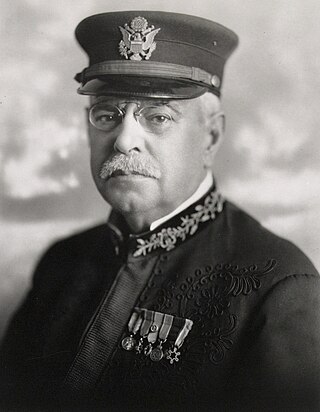
John Philip Sousa was an American composer and conductor of the late Romantic era known primarily for American military marches. He is known as "The March King" or the "American March King", to distinguish him from his British counterpart Kenneth J. Alford. Among Sousa's best-known marches are "The Stars and Stripes Forever", "Semper Fidelis", "The Liberty Bell", "The Thunderer", and "The Washington Post".
"The Liberty Bell" (1893) is an American military march composed by John Philip Sousa.
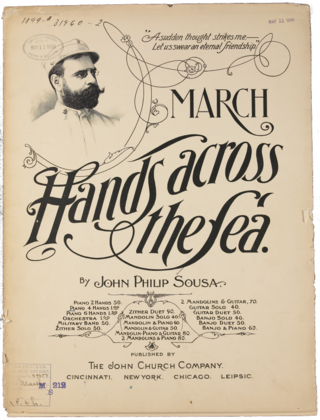
"Hands Across the Sea" is an American military march composed by John Philip Sousa in 1899.

Arthur Willard Pryor was a trombone virtuoso, bandleader, and soloist with the Sousa Band. He was a prolific composer of band music, his best-known composition being "The Whistler and His Dog". In later life, he became a Democratic Party politician from New Jersey, who served on the Monmouth County Board of Chosen Freeholders during the 1930s.

The United States Marine Band is the premier band of the United States Marine Corps. Established by act of Congress on July 11, 1798, it is the oldest of the United States military bands and the oldest professional musical organization in the United States. Today, the Marine Band includes the Marine Chamber Orchestra and Marine Chamber Ensembles.

Alton Augustus Adams, Sr. is remembered primarily as the first black bandmaster in the United States Navy. His music was performed by the bands of John Philip Sousa and Edwin Franko Goldman and his march "The Governor's Own" (1921) appears as the first selection on the bicentennial album Pride of America, released by New World Records.
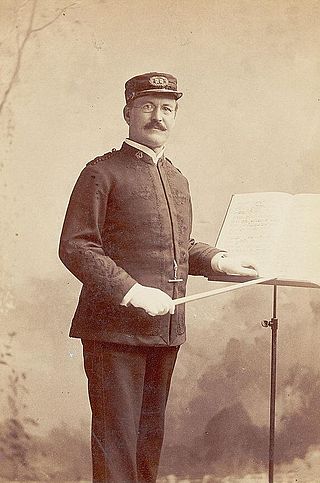
Patrick Sarsfield Gilmore was an Irish-born American composer and military bandmaster who lived and worked in the United States after 1848. While serving in the Union Army during the U.S. Civil War, Gilmore wrote the lyrics to the song "When Johnny Comes Marching Home". This was published under the pseudonym Louis Lambert in September 1863.

"National Emblem", also known as the National Emblem March, is a U.S. march composed in 1902 and published in 1906 by Edwin Eugene Bagley. It is a standard of the U.S. march repertoire, appearing in eleven published editions. The U.S. military uses the trio section as ceremonial music for the entry of the ceremony's official party.

Herbert Lincoln Clarke was an American cornetist, feature soloist, bandmaster, and composer. He is considered the most prominent cornetist of his time.

“The Minnesota March” is a march for wind band written by John Philip Sousa in 1927 for the University of Minnesota. Sousa received an informal request for the march from Minnesota football coach Clarence Spears, and "readily agreed" to a request from a committee of university officials in October 1926. Sousa used Indian themes in this march, and later added field drum and bugle parts. The march was published by the Sam Fox Publishing Company and was premiered by Sousa and his band on September 3, 1927 at the Minnesota State Fair. It was first performed at the University of Minnesota the next month, on October 26, with a performance by the university band.
The Gallant Seventh is a march composed by John Philip Sousa in 1922 whilst recovering from a broken neck. The march takes its name from the 7th Regiment of the New York National Guard. The conductor of the Regiment band was Major Francis Sutherland, a former cornetist in Sousa's own civilian band.
"The Gladiator" is a march by John Philip Sousa, written in 1886 while Sousa was leader of the US Marine Band.

"The High School Cadets" is a march written in 1890 by John Philip Sousa in honor of the cadet drill team of Washington High School in the District of Columbia. It is in regimental march form (I-AA-BB-CC-DD) and is a popular selection for school concert and marching bands, as well as for professional orchestras and bands. The march has been arranged for a wide variety of instruments and ensembles, and has been frequently recorded, including at least two recorded performances by Sousa's own band. The march's final strains were featured in the 1939 film The Under-Pup.
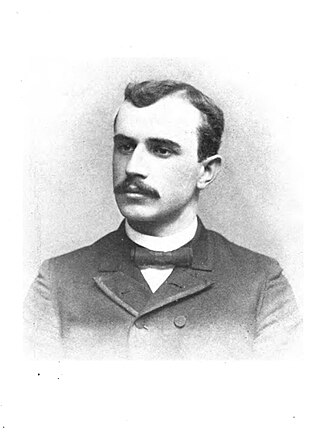
Roland Forrest Seitz (1867–1946) was an American composer, bandmaster, and music publisher. For his many march compositions he earned the sobriquet “The Parade Music Prince”.

The "Transit of Venus March" is a march scored for military brass band written by John Philip Sousa in 1883 to celebrate the 1882 Transit of Venus and published by the J.W. Pepper Company. The work was erroneously thought to be lost for over 100 years when a piano transcription published in 1896 was found by a Library of Congress employee in 2003. Copies of the original Pepper publication, however, do survive.
John Clifford Heed (1862–1908) was an American composer and musician, best known for composing over 60 marches.
The "Kansas Wildcats" is a march composed by John Philip Sousa. He composed the song after a petition from students and faculty from the Kansas State Agriculture College when Sousa brought his band to Manhattan, Kansas in 1928. The song was completed and then dedicated to the college in 1930. The piano score arrived at the college in 1931 and has become an integral part of Kansas State Wildcats football games and lore.

"Columbia's Pride" is a patriotic American march composed by John Philip Sousa in 1914, based on his 1890 song, "Nail the Flag to the Mast." "Columbia's Pride" was published in 1914 by Theodore Presser Co. in Philadelphia as a score for piano.
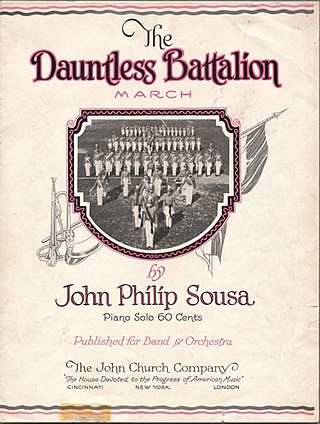
"The Dauntless Battalion" is an American military march by John Philip Sousa, published in 1922 and dedicated to the faculty and cadets of the Pennsylvania Military College in Chester, Pennsylvania, known today as Widener University. Sousa received an honorary doctorate from the college in February 1920 alongside future president Warren G. Harding.

Stephen Bulla is an American composer and musician best known compositions for the United States Marine Band and The Salvation Army.
















